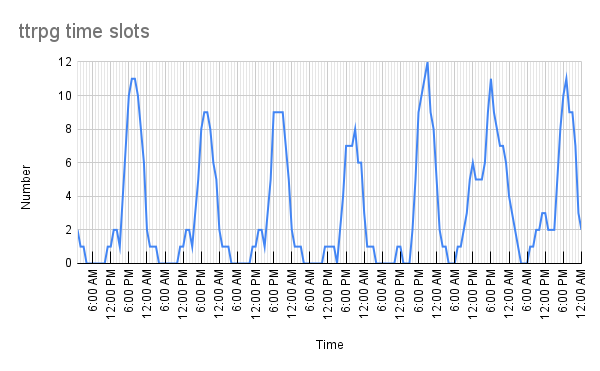I’d like to present these ideas to the community of Role Players and would be curious to hear other people’s thoughts on this. I feel that RPGs represent a new art form and that the state of the art is in its infancy. I’d like to ruminate on the topic for a bit.
RPGs are a new art medium akin to the canvas, the printing press, and film. They present a structure upon which a new art form has been created in the last light of the 20th Century. They bring together a set of skills and prior art forms, mixing them together into a new combination that has not been seen before. Storytelling, cartography, improvisational theater, mathematics, history, science, and fantasy have been co-mingled in an infinitely variable medium in order to create a form of entertainment that can be as immersive as a great novel, as exciting as a joust, as thoughtful as chess, and as funny and charming as the best theater. Can be. However, up until very recent days Gamesmastering has been, despite its joys, an indisputable burden. Creating a World and managing a game are hard work.
Recently, though, we’ve begun to see a new set of tools online that seem to offer help with the various aspects of GMing that make it difficult. And even better tools are on the way. These tools will make it easier over time for Gamesmasters to create and host their worlds, either at home with their friends or online for anyone who is connected to the Internet. Roll20, TavernKeeper, Obsidian Portal, PC Gen, Fantasy Ground and Realm Works, to name a few, are software applications that take various aspects of the GM’s tasks and either automate them or help manage them. New systems will come online as well. Among them will be mine. It’s a system called Elthos RPG. I’m very proud to be among the pioneers in this new art.
I believe that the future of RPGs is very bright. The reason why is because no other activity brings together such a plethora of skills and arts into one comprehensive whole and makes something as fabulous as the social experience of creating a story with your friends. While many RPGs focus on combat and tactics, there are others that produce amazing stories out of the game play. It is toward these experiences that I think the future is leaning.
I imagine a future in which Gamesmasters will be able to host worlds online for scores, hundreds, and eventually thousands of players at a time. Teams of Gamesmasters will be able to co-create and co-GM these worlds, keeping them alive with ever changing story lines, and building histories out of what the Player Characters do. I envision being able to play in these worlds via optical interfaces that bring together artwork, music, and story craft into one comprehensive medium upon which Gamesmasters and World Weavers will be able to paint fantastic universes. We will no longer go to the movies – we will be our own main Characters in the movies… or in the game.
I believe that to fulfill this vision some Gamesmasters will rise to a level of skill and mastery of the art that will allow them, compel them in fact, towards a career of Professional Gamesmastering. And I think that the confluence of creativity and skills necessary to do so, along with the tools that are being prepared for it, will bring us into a new age of creative endeavor where the lines between authors and actors, artists and musicians, story tellers and the audience will blur and dissolve. We will become the art, and the art will become us.
I’m delighted to have the opportunity to participate in this grand experiment and experience. I look forward to this future with great anticipation.
Additional Points Recently Made By Members of PGMS
“The other advantage (V)TTRPGs have over other forms of media and storytelling is the self-deterministic model. Even running based on pre-published adventures and campaigns, there is ample room for GM and players to together take the story places the authors of the modules never even considered. This both creates the ongoing sense of novelty humans crave while simultaneously customizing the content to the preferences of each audience.”
“Given that computer personas are getting pretty Turing-capable already, I think the live playing of NPCs is just gravy. With the automation and delegation of submechanical systems to take up 90 (?) percent of gameplay on a “tactical” level, this leaves the GMs free to plan and distribute narrative structures in ways that are more strategic and narrative: meaningful and specific to Players. The greater portion of the GM Team’s time might be developing themes, adding symbolism, setting up connections between narrative modules, plus “cutaway” moments which might use the NPC features for onboarding, mission negotiation, and hook scenes, whatever.”


